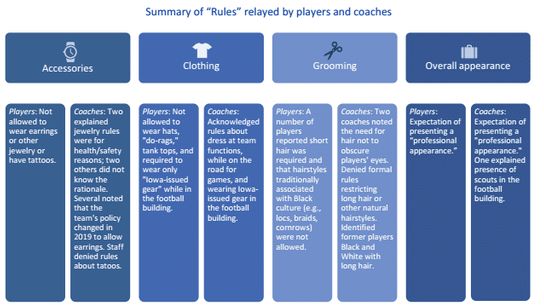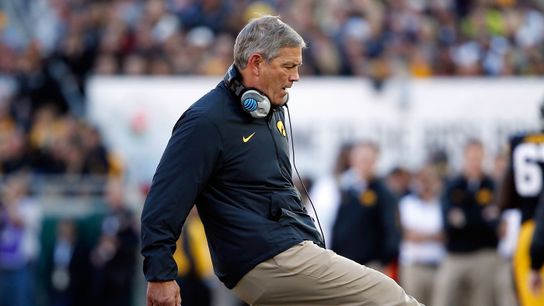The Iowa football program spent the past two months walking the following tightrope:
1. Kirk Ferentz is responsible for the culture inside Hawkeye football.
2. That culture is in need of significant repair.
3. Kirk Ferentz is the right person to continue leading Iowa football.
To be clear, Iowa in general and Ferentz in particular have never shied away from their part in the feelings of numerous former Hawkeye players, who over the weekend of June 6 began coming forward with tales of demeaning and racially biased treatment during their time in Iowa City. "This is a defining moment for the Iowa Hawkeye football program," Ferentz said back then.
Ferentz spoke to the public at numerous points along the way, all the while deferring questions about specific problems and solutions, until the conclusion of an ongoing independent investigation into the program.
That investigation is no longer ongoing. It was released to the public on Thursday morning, and by Thursday afternoon it was time to finally answer questions. The two most pressing: If this is your culture, and you admittedly overlooked a problem that developed right under your nose, how are you the right man to fix it? And how are you going to go about fixing it?
In short, Ferentz believes he delegated too much responsibility and authority to Chris Doyle, the longtime strength coach who was let go on June 15.
"Clearly, there’s a disconnect with the vision that Kirk has for the Iowa Way and the way it was being experienced by some of our student athletes and especially our Black student-athletes," Barta said Thursday.
Moving forward, Ferentz said he'll make three adjustments to fix the program:
1. Pay more hands-on attention to his assistants.
"As the head coach, I've prided myself on running an NFL-style college program, which means position coaches have the autonomy to develop the curriculum as they so choose," Ferentz said. "I am responsible. We're focused on creating a more inclusive program for all. Over the past few weeks I learned our culture was not as strong as I thought. A few of our coaches crossed the line from demanding to demeaning. That's never acceptable."
While he thought he was delegating responsibility to his assistants in order to streamline the operation, Ferentz actually allowed Doyle to morph The Iowa Way from what he thought it meant -- Graduate, Make the Most of Football, Have a Great College Experience -- into how players experienced the Iowa Way.
And that, in the words of the Husch Blackwell law firm, was this: "The stereotype of a clean-cut, White athlete from a midwestern background."
This chart from the Husch Blackwell report cuts to the disconnect between what Ferentz thought he was selling and what Iowa players were told to buy:
Reading this, it's easy to see how a disciplined culture becomes regimented when you're at the bottom end of the power structure.
2. Focus more on stuff that actually matters, and less on what doesn't.
This was what first popped out when former players started coming forward last month. That the dress code for Iowa players just so happened to approve a look that a middle-aged white man might seem appropriate while barring clothes and accessories favored by young Black men.

The dress code rules have since been changed, but the dress code was just a symptom of a larger problem: A general obliviousness to growing up Black in a white culture.
One media member told a story that I thought was instructive: A player had described a conversation with a coach where the coach explained he was expected to get on a boat and leave his past self behind. It was lost on the coach but unavoidable to the player how totally opposite that metaphor hits depending on how your ancestors arrived on this land.
Ferentz acknowledged Thursday that the choice of words was poor and, more importantly, the entire point of the lesson was wrong. Iowa players don't leave their past selves behind when they put on the black and gold.
Or, at least they won't any longer, Ferentz pledged.
The boat story could be viewed as a clunky, misguided lesson in isolation, but taken in context with everything else, it drives home the point that Iowa's Black players were expected to perform and conform.
3. Invest more in relationships with his players.
Though they were born by completely unrelated events, the Iowa and Oklahoma State controversies of this summer are intimately connected.
Both Ferentz and Mike Gundy are successful coaches firmly established in their jobs. Their time in that job and their continued success led to a gradual disconnect from their program, a misguided belief that their culture was so entrenched that it could run on autopilot. And in Ferentz's absence, Doyle filled a void with his own culture.
"To have one person in charge of so many things in retrospect was a mistake," Ferentz said. "To have one person correcting them over and over. Those responsibilities will be diffused moving forward so the players aren't being corrected by the same person time and time and time again."
This wasn't all Doyle's fault, Ferentz admitted. After all, it was Ferentz who ceded the power to Doyle in the first place. Moving forward, Ferentz will take more oversight upon himself while also spreading out Doyle's authority to multiple assistants.
Ferentz handed Doyle authority over the culture, and in turn that culture morphed into something where players were punished for their honesty.
One of the bullet points to emerge on Thursday was that Iowa players were required to wear sleep monitors each night, then found themselves embarrassed in front of their teammates for getting poor sleep.
Much like the "Iowa Way" word association game played above, it's an illustration at how easily a well-intentioned objective -- a culture built on accountability and discipline, the value of a good night's sleep -- can turn oppressive. (Moving forward, only freshmen will be required to wear sleep monitors, and any feedback will be provided in the form of a private conversation on the benefits of good sleep, Ferentz said.)
"That's one of the things I've wrestled with as much as anything. How do you see things quicker? How do you hear things better? In my mind, we had that position in charge of too many things," Ferentz said. "What responsibilities can we move? What things were being monitored that didn't need to be monitored, that weren't really important? The things that we are monitoring and deeming to be important, are they reasonable?"
Much like Gundy pledged to do after the OAN t-shirt controversy, Ferentz believes he can go a long way toward fixing the problems that developed under his watch simply by investing more in his current players.
"The heart of coaching is relationships," he said. "We spend a tremendous amount of time and energy to bring players into our programs. That commitment to those individuals can and should grow in their time on campus."
All that is well and good, but Iowa will have to prove that the problem can be fixed by removing Doyle and only Doyle.
To be sure, conversations with current and former Iowa players revealed the views on Ferentz to be largely positive, and the players continued to endorse him as the program's head coach. But Doyle was not the only coach accused of verbally caustic comments toward players; Offensive coordinator Brian Ferentz and linebackers coach Seth Wallace were as well.
"It’s not a done situation but I feel confident that we don’t have any [further] changes in employment," Barta said.
Barta said Thursday that the cultural changes implemented in June have been met with approval by Iowa's current roster, but noted many players are taking a wait-and-see attitude to see if they'll stick when the attention of this summer fades.
Ferentz's message Thursday -- the official end of this near 2-month process -- was the same as it was in the beginning.
"This has certainly been a moment of truth for me as a leader," he said. "The release of the independent review will lead to our next chapter."
